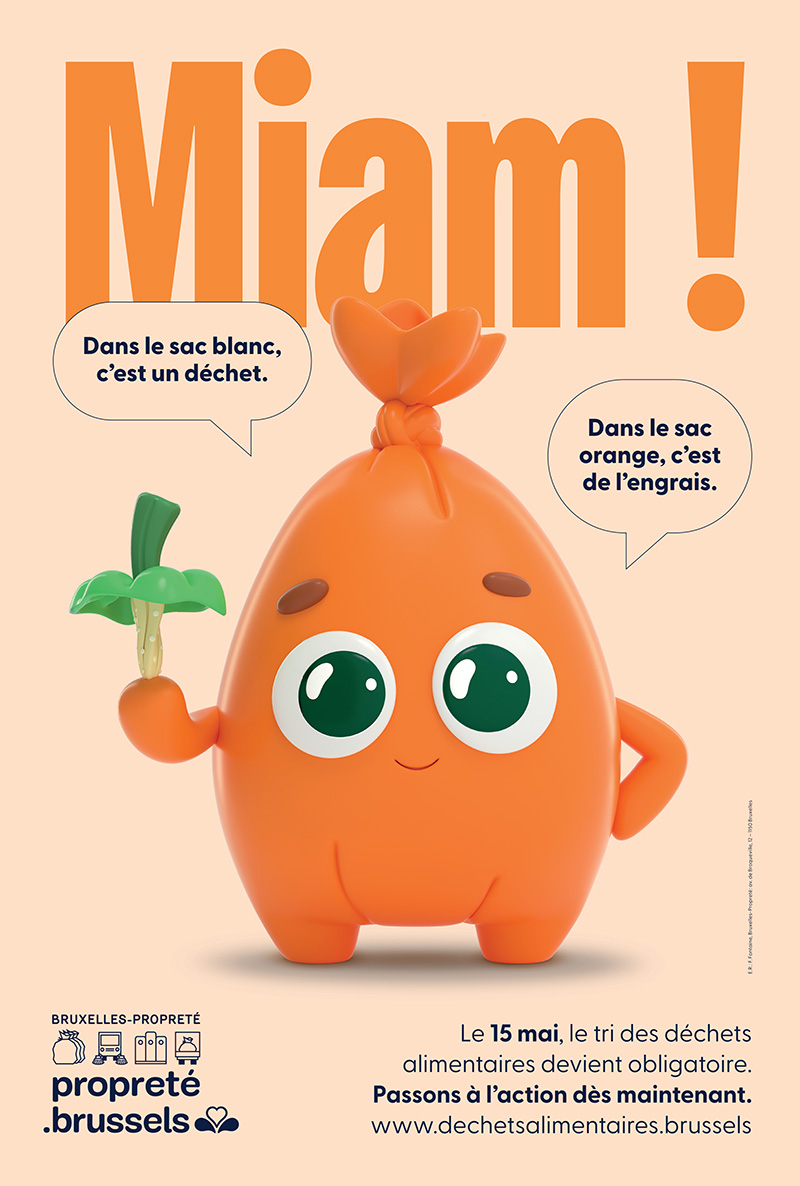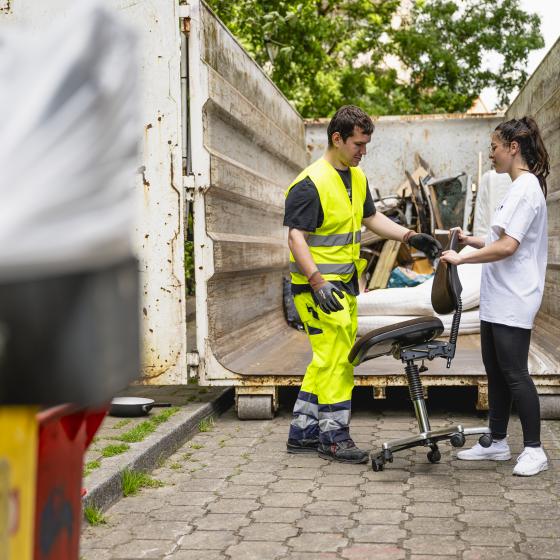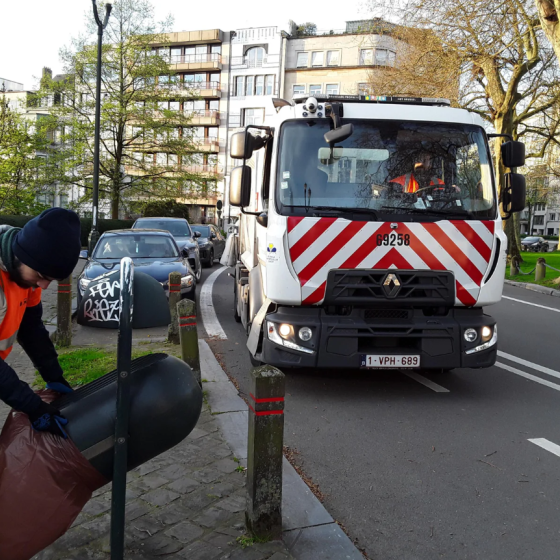Successful increase in waste sorting in Brussels - 5 month evaluation

Brussels-Propreté presented a comprehensive evaluation of the reform of household waste collection, marking a pivotal moment in urban cleanliness. This initial assessment, conducted five months after the implementation of significant changes in waste sorting and collection frequency, highlighted a positive trend in waste sorting for the period from May to August 2023.
As a reminder, three major changes were introduced on May 15, 2023:
- Mandatory Sorting of Food Waste: Introduction of the orange bag for food waste or individual or neighborhood composting.
- Expanded Plastic Waste Sorting: Mandatory sorting of packaging and various other plastic items in the blue bag. This includes tubes, trays, containers, pots, cups, packaging films from bottles and cans, as well as plastic packaging.
- New Bag Placement Schedules: Implementation of new schedules for bag placement, with trucks passing once a week for 10 municipalities and evening collections for certain areas.
Encouraging Increase in Food Waste Sorting
EU Directive 2018/851 mandates the collection or valorization of biowaste at the source by December 31, 2023. Achieving this directive is crucial for Brussels to reach the 60% municipal waste sorting target for reuse and recycling by 2030.
The recent reform aimed to improve the collection of food waste, previously representing over 40% of the weight of the white bag. The evaluation highlights a substantial increase in collected biowaste: between May and August 2023, Brussels-Propreté collected 6,998 tons compared to 3,836 tons in the same period in 2022, an increase of 82%.
The monthly progression shows consistent growth compared to the same months in 2022.
- In May: from 1,094 to 1,614 tons (+48%)
- In June: from 1,257 to 2,196 tons (+75%)
- In July: from 789 to 1,617 tons (+105%)
- In August: from 696 tons to 1,571 tons (+126%)
For apartment buildings equipped with large containers, encouraging figures have been observed, with 1,281 tons of food waste collected between January and August 2023, compared to 538 tons in the same period in 2022. However, there is still room for improvement, as only 35% of these buildings currently participate in biowaste collection.
Increase in Selective Sorting and Reduction of Residual Waste
Brussels-Propreté is pleased to note a positive trend in all categories of selective sorting for the period from May to August 2023. Items such as tubes, trays, and yogurt pots have been transferred from the white bag to the "new" blue bag, with a significant increase in the tonnage of the blue bags:
Between May and August 2023, Brussels-Propreté collected 7,219 tons of PMC (Packaging, Metals, and Cardboard) compared to 6,320 tons. This represents an increase of 14%.
Sorting of green waste (+28%) and paper/cardboard (+3%) has also increased.
This increase in selective sorting has a direct impact on the reduction of residual waste in the white bag. Since May 2023, a decrease of about 9% in household waste has been observed, equivalent to 6,000 tons that have not been incinerated.
After objectifying recurring problematic areas with supporting images, Brussels-Propreté decided to initiate a first wave of enforcement on September 14, with the aim of penalizing only clear abuses regarding both non-compliance with the new schedules and failure to sort. These checks are still ongoing, and so far, about fifteen operations have taken place in the territory of various Brussels municipalities, involving 4 inspectors and 2 public cleaning workers each time. These checks have resulted in the drafting of about a hundred reports and warnings. In the absence of prosecution by the public prosecutor, offenders will have to pay removal and administrative fines, with cumulative amounts ranging, indicatively, from 300 to 600 euros.
In parallel with enforcement or preceding it, Brussels-Propreté will continue to raise awareness among Brussels residents. Another campaign is planned in the coming weeks, including on-the-ground actions and calendar distributions, led by multilingual facilitators. Teams will focus mainly on areas where results are not yet satisfactory.
Municipal Meetings and Feedback
The reorganization of collections provided an opportunity for enhanced collaboration with municipalities. The local level was involved in the early stages of considering the collection reform, and during implementation, the Agency increased exchanges with municipal authorities to deeply understand the realities they faced. Where possible, the Agency sought to incorporate the requests of municipalities into the design of the schedule and the follow-up of the collection reform.
In post-implementation meetings in the second half of September, it was observed that, in general, municipal authorities were satisfied with the implementation of this reform. However, the main point of concern for municipalities remains the 6:00 PM to 8:00 PM window, which many consider too short for households to place their bags comfortably. Despite explanations, Brussels-Propreté has decided to explore solutions that could include an extension of this time slot.
Other areas for improvement were raised by municipal authorities, and the regional agency is already working on them:
- Carrying out targeted awareness actions based on operational observations on the streets to remind users (households and businesses) of the placement schedules.
- Coordinating enforcement actions between the Agency and municipalities.
- The figures and trends presented suggest that the waste collection reform in Brussels is making progress, but ongoing efforts in awareness, enforcement, and collaboration with municipalities will be essential for sustainable success.
The reform of the waste bag collection schedule and the mandatory sorting of food waste introduced on May 15, 2023, has aspects that relate to the urban cleanliness strategy of clean.brussels, particularly in its objectives to combat littering, prevention, and enforcement. Indeed, well-sorted and properly placed household waste reduces the risk of public space becoming dirty.
These two reforms are directly motivated by the Regional Plan for Air, Climate, and Energy.
For more information on mandatory waste sorting in the Brussels-Capital Region, you can also visit this website: organicfoodwaste.brussels.




